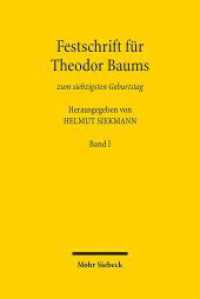- ホーム
- > 洋書
- > 英文書
- > Science / Mathematics
基本説明
With emphasis on the underlying theory, techniques to analyse and design practical iterative coding systems are presented. Using Gallager's original ensemble of LDPC codes, the basic concepts are extended for several general codes, including the practically important class of turbo codes.
Full Description
Having trouble deciding which coding scheme to employ, how to design a new scheme, or how to improve an existing system? This summary of the state-of-the-art in iterative coding makes this decision more straightforward. With emphasis on the underlying theory, techniques to analyse and design practical iterative coding systems are presented. Using Gallager's original ensemble of LDPC codes, the basic concepts are extended for several general codes, including the practically important class of turbo codes. The simplicity of the binary erasure channel is exploited to develop analytical techniques and intuition, which are then applied to general channel models. A chapter on factor graphs helps to unify the important topics of information theory, coding and communication theory. Covering the most recent advances, this text is ideal for graduate students in electrical engineering and computer science, and practitioners. Additional resources, including instructor's solutions and figures, available online: www.cambridge.org/9780521852296.
Contents
Preface; 1. Introduction; 2. Factor graphs; 3. Binary erasure channel; 4. Binary memoryless symmetric channels; 5. General channels ; 6. Convolutional codes and turbo codes; 7. General ensembles; 8. Expander codes and the flipping algorithm; Appendices: A. Encoding low-density parity-check codes; B. Efficient implementation of density evolution; C. Concentration inequalities; D. Formal power sums.








